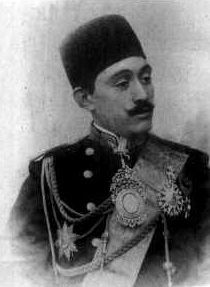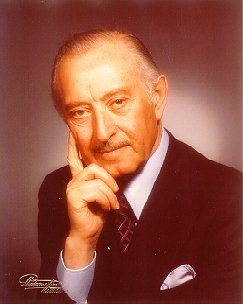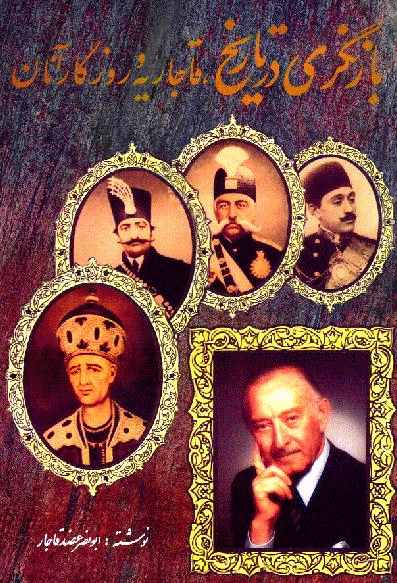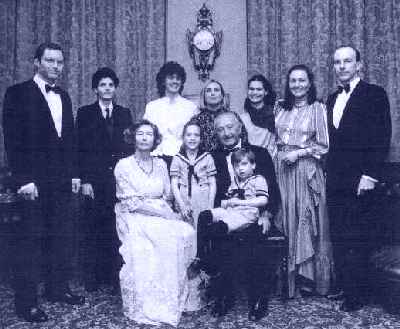 Prince Abol Fazl Mirza, Azod-os-Soltan (Kadjar), son
of Mozaffar-ed-Din Shah Qajar (Kadjar) and father of Prince Abounassr Azod (below).
Prince Abol Fazl Mirza, Azod-os-Soltan (Kadjar), son
of Mozaffar-ed-Din Shah Qajar (Kadjar) and father of Prince Abounassr Azod (below).Shajarehnaameh Project
Azod (Kadjar)
Ancestor: Mozaffar-ed-Din Shah Qajar
His son:
 Prince Abol Fazl Mirza, Azod-os-Soltan (Kadjar), son
of Mozaffar-ed-Din Shah Qajar (Kadjar) and father of Prince Abounassr Azod (below).
Prince Abol Fazl Mirza, Azod-os-Soltan (Kadjar), son
of Mozaffar-ed-Din Shah Qajar (Kadjar) and father of Prince Abounassr Azod (below).
 Prince Abounassr
Azod (Kadjar).
Prince Abounassr
Azod (Kadjar).
Prince Abounassr Azod was the grandson Mozaffar-ed-Din Shah Qajar (Kadjar), architect of the Iranian Constitution. His father, Prince Azod-os-Soltan, was Mozaffar-ed-Din Shah's son. His mother, Mrs. Daftar-ol-Molouk, was the sister of the late Dr. Mohammad Mossadegh, Prime Minister of Iran (1951-53).
Prince Abounassr Azod, completed his studies in Iran and later on went to France where he obtained a degree in agricultural research and engineering. Upon his return to Iran, he entered the service of the government where, for more than twenty years, he occupied functions at the highest level. Among others, he held the distinguished posts of High Inspector of the Prime Ministry and also Deputy-Director of the Forestry Organization. Following the 1953 coup-d'etat against Dr. Mossadegh, Prince Abounassr Azod left the service of the government and entered the private sector.
A well-known pioneer of Iranian industry, Prince Abounassr Azod was the founder and Director-General (CEO) of the Ahwaz Sugar Refinery and the Dezful Sugar Refinery. He contributed with foresight and brilliance to the development of Iranian agriculture. His remarkable plans and course of action regarding winter-sugar-beet culture in the warm province of Khuzistan, remain to this day, one of his great achievements and won international praise. They were the cornerstone for important agro-industrial projects and the introduction of a new era in the sugar industry of Iran. Prince Azod's Ahwaz Sugar Refinery was a symbol of Iran's industrial activities. The Ahwaz Sugar Refinery, with an annual output of 500.000 tons of loaf and cube sugar was the most productive sugar refinery in Iran and constituted a tiny modern town in the heart of the Khuzestan Desert. The first private sugar refinery constructed in Iran, it had a unique organisation and the living standard of the workers were comparable with those of European countries. Prince Abounassr Azod was Secretary of the Syndicate of Sugar Industry and Vice-president of the Chamber Industries and Mines of Iran. In 1976, he became President of the Credit Bank, "Bank Etebarate Iran," which operated with private Iranian capital and the active participation of four French banks. A few months prior to the Iranian revolution of 1979, Prince Abounassr Azod left for France where he resided until his death in August of 1998.
_________________________________
My Three Encounters with Reza Khan (Sardar Sepah)
Many ignore it, but during the reign of the Qajars, the immediate and closest members of the royal family were strictly forbidden from venturing into business and trade. If they had no income of their own, their only prospect to secure a living was an assignment with the government, the army, the diplomatic corps or conceivably the governorship of a province. My father Prince Azod-os-Soltan, was one of the five sons of Mozaffar-al-Din Shah, a remarkable and devout king who initiated the Iranian Constitution and the National Assembly known as the Majliss. He was accessible to all his subjects and often roamed Tehran at night and in disguise to take the pulse of his country. Like Qajar kings before him, he was approachable by all his subjects. Lord Curzon writing on the subject said that when the Shah drove around the capital or the countryside, "he did not allow for any unnecessary zeal on the part of footmen and was available to any one of his subject who may press forward to offer him a petition." Mozaffar-al-Din Shah understood that a king must assent to the will of his subjects for the greater benefit of the realm -- unfortunately, he passed away shortly after his dream for a constitution was realized. Anyhow, the Qajar dynasty still ruled when I was a little boy and my father, Prince Azod-os-Soltan, following a tenure at the governorship of the Luristan province became governor of Kermanshah.
We were in Kermanshah, a prosperous and verdant province of Persia, when we were informed that Ahmad Shah, the young Qajar king who was on his way to visit Europe was passing through our province with his entourage. Among his retinue was the commander of the army the "Sardar Sepah," who was later to become King Reza Shah Pahlavi. My father was busy giving orders to attendants who were absorbed in the many details of the welcoming ceremony of the Shah and his entourage. My mother, Daftar-ol-Molouk, the sister of Dr. Mohammad Mossadegh and grand-daughter of an eminent Qajar vizier, instructed me to wear a uniform for the circumstance. Ahmad Shah Qajar was in fact my cousin, the son of my father's brother. I was nine years old at the time and the servants promptly had me wear my best attire. I went on my way to greet the Shah accompanied by my sister's husband, Seyyed Hassan Ojaq, one of the most prominent religious constitutionalist of Kermanshah. I must add that the Ojaq family were from a family of prestigious religious leaders of Kermanshah and that Seyyed Hassan Ojaq in particular, was considered by the people as a holy person in whom they had total trust. They worshipped and revered him to such an extent that merely touching his hand was considered auspicious. Even the rose-water with which he washed his hands was kept and dispensed to sick people in order to bring them salvation.
The testament of Agha Mohammad founder of the Qajar dynasty destined to his brother's son, Baba Khan, heir to the throne who later became renowned as Fath Ali Shah, stipulated that the permanence of Iranian monarchy was rooted on marriage with religious dignitaries. In due conformity to this tradition, my father married three of his daughters to prominent religious leaders. One daughter was married to Seyyed Hassan Ojaq. Another was betrothed to Seyyed Hassan Khakbaz whose father was an important religious personality of Arak. The third daughter became the wife of Nekah Haj Mohammad Rastin who belonged to yet another renowned religious family of Arak. Rastin was also a member of the Gonabadi Darvishes and had a multitude of followers. Thus was the reasoning of the time to sustain monarchy.
Anyhow, accompanied by the holy Seyyed, I jumped in the car and we drove on a dusty and pot-holed road to salute the Shah. When we arrived at the residence of the king, I asked for permission to see His Majesty. The staff guided me to a room where the Shah and his Sardar Sepah were sitting alone. I saluted the Shah and presented my respects. The Shah was very friendly and said: "Hey, little Azod how are you?"
I promptly kissed his hands and in turn he kissed my face. I was happy and encouraged, but in one of these childish whims that occur so suddenly, I decided to seize the opportunity and engage into a major discourse.
"Ghorban, (Sire)" I ventured, "When we drove to see Your Majesty with Seyyed Hassan Ojaq, the roads were so badly neglected that we almost had several accidents and could have easily turned over and died." Then I quickly added: "I beseech Your Majesty to give prompt orders to the responsible individuals so that instead of filling their pockets with money -- they fittingly use the funds in meaningful tasks as such as repairing the roads, so that people won't endanger themselves when traveling!"
Ahmad Shah who did not expect such towering remarks from a youngster began to laugh loudly and finally turning toward Sardar Sepah he said: "It looks like the little Azod has become quite impertinent and cheeky. Pull his ear and take him out of this room."
Wearing a Cossack uniform, the tall and fierce-looking Sardar Sepah advanced slowly, snatched my ear and directed me to the door. I began to cry my heart out searching for my mother. When I finally found her, I narrated my story and the awful events. May Almighty God bless her soul, I will eternally remember her answer: "Dear son" she said, "Keep my advice in your mind, never be afraid to utter the truth for God will always help you."
This was the first true teaching imparted in my life, I received it from my mother and will remember her wisdom forever. She was a truly enlightened woman and a fearless fighter as well. In those days of great turmoil, when the Qajar monarchy became shaky, she went on to the Baharestan, delivered speeches, harangued and galvanized the crowd. These were unbelievable feats in days when women rights were strictly restricted, even in Europe. Old Persia was changing however and my mother's powerful personality was admired by many, including Seyyed Hassan Modaress, the dynamic and forceful leader of the clerical bloc in the Majliss. He was one of the better educated and certainly highly influential religious personalities of the time. At least once a week he consulted my mother on various topics and exchanged many ideas with her. When Sardar Sepah, finally gained full authority and was granted dictatorial powers, Modaress, Mossadegh and a few others remained among a tiny minority group of the parliament to oppose this show of force.
The second encounter with the Sardar Sepah
Reza Khan "Sardar Sepah" had become the Prime Minister of the Shah and Nossrat Dowleh minister of finance in his cabinet. Nossrat Dowleh who had harbored a nasty family grudge refrained from disbursing my father's dues. I must explain that finance minister Nossrat Dowleh, the son of Farman Farma had been the first husband of my mother and a first cousin. She was his aunt on my father's side. My half-brother, Mozaffar Firouz was born from that first marriage. Soon after the marriage, Ezzat-ol-Saltaneh the wife of Farman Farma and daughter of Mozaffar-al-Din Shah started to feud with Nossrat Dowleh and life became impossible for my mother. She fled her husband's house and went to her mother Nadjm-ol-Saltaneh, the sister of Farman Farma.
Nadjm-ol-Saltaneh conscious that her daughter could no longer live with Nossrat Dowleh admonished her brother and said: "You married my daughter to your son but you do not have the courage to have your son stop distressing her. I will not allow my daughter to return and I demand for her an immediate divorce." Mortified Nossrat Dowleh never forgot this event and entertained an amazingly deep resentment towards my father. He took advantage of his new appointment to sever the dues of my father. Since we had little wealth left, the predicament had severely paralyzed and disturbed our existence. Generally, a Qajar household consisted not only of the immediate family but also of many attendants, guards, secretaries, nannies, valets, cooks, teachers etc. who depended on us for their very subsistence and were considered as member of the family. As the situation worsened, my unyielding mother woke me up one morning and said: "Son, wear your most regal uniform and take this personal missive to the Sardar Sepah."
Impeccably dressed and accompanied by a soldier of my father's guard, I went on to the office of the Sardar Sepah. As soon as I entered his bureau he recognized me and mindful of our first encounter with Ahmad Shah he said: " Little Azod, how are you? I hope your ear does not hurt, what do you need?" I respectfully replied, "No Sir, but I have a private request to submit to Your Excellency." He took the envelope, opened the seal and read the letter. Then addressing my footman he promptly said: "Get the answer tomorrow from the War Ministry." The next day we went to the war ministry, the Sardar Sepah had ordered several thousand tomans of my father's accumulated wages to be paid immediately.
As time passed Nossrat Dowleh finished inauspiciously. His end was dramatic for the Sardar Sepah had him arrested and executed later on. When Mokhber-ol-Saltaneh Hedayat went to ask for his forgiveness and mercy, the Sardar Sepah did not receive him and let it be heard to all: "What good did Nossrat Dowleh do to his family? If he failed his closest relatives he will certainly do much worse to me." Obviously, Reza Shah was referring to Nossrat Dowleh's confiscation of my father's wages and for some special reasons had lost confidence in his minister.
Third encounter with Sardar Sepah who had become Reza Shah Pahlavi
As we now know "Sardar Sepah" overthrew the Qajar dynasty and became king Reza Shah Pahlavi. Upon my return from Europe, I was drafted into the military service. One day, following six months of hard training at a specialized military camp, the time arrived for a graduation ceremony to a higher rank in the corps. This ceremony took place in the presence of Reza Shah. Being taller than most of my fellow-graduates, I was always placed in the first row. When he arrived for the inspection, Reza Shah scrutinized me from head to toe. He advanced in front of the graduates, stopped and and went back a step or two. He was very tall, way over 6 foot and surveyed me from his height. I was overwhelmed with fear but fortunately, he passed me off. I will always recall this ceremony which took place on the first day of the Iranian new year. One of the graduates, whose father, a well-known member of the justice ministry had been jailed upon the orders of the Shah, suddenly stepped out of the ranks. With utmost daring and courage he addressed the King and said: "Your Majesty, today is a holiday and the first day of of the new year and for a new year offering, I beseech Your Majesty to free my father from prison." Reza Shah immediately granted the request of the officer and dispensed orders to liberate the graduate's father. However, later on the graduate was subjected to a month's detention, for according to rules and regulations, addressing the King at a ceremony was strictly forbidden.
This was an example of some of the grandeur and some of the many positive aspects of Reza Shah's personality which I consider it my duty to report here. No doubts that the British brought him to power. But it must be acknowledge, that anyone else in his place, would have also seized upon the occasion, specially when sensing that the britishers had such an inclination. Despite all of that, Reza Shah had a deep sense of patriotism which many times resulted in forestalling England's negative actions. Many of his accomplishments such as the establishment of order, the organization of an army and ministries, the construction of roads, railroads and the creation of a modern industry were praiseworthy. I must mention here his establishment of ten sugar refineries for the country.
Certainly, these plants had the time had a low capacity and could not produce more than three hundred tons of sugar a day. But that was a good beginning. Despite the fact that during the rule of Reza Shah I endured six years of exile and imprisonment, I must confess that he achieved some quite beneficial realizations for the country. All the same, there are due criticisms,specially in regard to social justice and some other events. One of these relates his forceful acquisition of properties from people living in our northern provinces. Another negative aspect was his disregard for the Iranian Constitution and democratic rules. In the long run, this negative trait transformed him inevitably into a dictator. It is alleged that when he was forced into exile by the Allied invaders, the first thing he asked prime minister Foroughi was: "What will happen of my estates?" Foroughi answered: "Sire, presently you must leave the country, the estates are not going to go anywhere, they will remain inside the country."
_____________________________________

This is the cover of Prince Azod's book entitled A Review of History: The Qajars and Their Times. From left to right it features Agha Mohammad Khan Qajar, Nasser-ed-Din Shah Qajar, Mozaffar-ed-Din Shah Qajar, Prince Azod-os-Soltan Qajar and Prince Azod himself.
_______________________________________

Prince Abounassr Azod, his wife Anita Azod and their children, sons and daughters-in-law, and grand-children.
_____________________________________
Back to Qajar (Kadjar) Families Page
_________________________